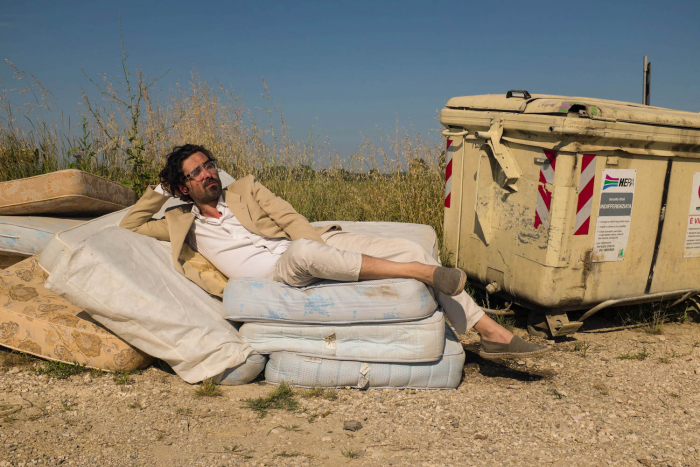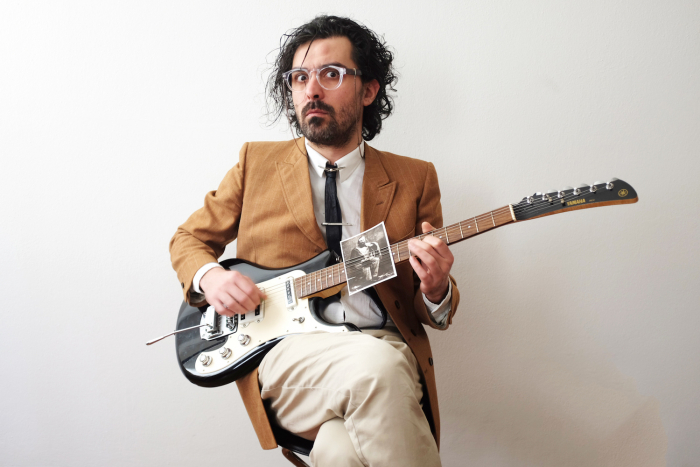
Supermarket: the best calypso music of the coastline comes from the mountain!
by Michele Orvieti
Our tour through the various branches and subgenres of the liscio music coming from the Romagna region continues.
And this time, ladies and gentlemen, I am happy to introduce you to the “Supermarket”, the first and only Romagna world music band in the whole world!
This music project, with Alfredo Nuti dal Portone at the helm (he collaborated with Saluti da Saturno, Jang Senato, Giacomo Toni, Granturismo and the Extraliscio that featured in our first episode), mixes up the calypso, tango, mariachi and manouche, free jazz, no wave and punk genres. It’s a sparkling and crazy group which covers themes and rhythms characterised by a “cheerful” touch, inspired by the decadent and kitsch riviera, an imaginary coastline that sprouted from the fantasy of this people from the Apennines mountain, who despise the sea and cannot even swim.
According to the journalist and writer Luigi Bertaccini, expert of the Romagna musicians, the Supermarket can reproduce the atmospheres of Africa, New Orleans, the balera dance halls, the tropics, South America, just like Salgari was able to give us a taste of Malesia without actually ever being there.
The Supermarket group was funded around 2010, when Alfredo creates the first experiment of energy core without a specific repertoire: inspired simply by rough concepts, the original formation was a crazy side-project, where every musician was interchangeable. A chaotic, but extremely “alive” crowd that above every expectation in the following years became a concentrate of the best Romagna creativity, until it settled into a stable quartet.
Thanks to their spontaneous cabaret skills, during the following years the Supermarket developed into a real small show-orchestra, performed hundreds of times every year and sold thousands copies of their (empty) demo.
Alongside the acrobatic Portone, the ensemble features: Marcello “Gianduia” Detti (trombone, all kind of brass instruments, funnel, seashells and cabaret), Roberto Villa (double bass and electric bass) and Daniele Marzi (drums and percussion). Their first LP, called Portobello, was produced by the super-romagna label “L’Amor Mio Non Muore”, tightly linked to the namesake recording studio, which offers a vintage and analogic experience, based in Forlì.
Romagna world music is plunged into an immense territory: the best calypso of the coastline comes from the mountain!
First of all, I’ve asked to Alfredo Nuti dal Portone to give me a definition of “Romagna world music”.
“Thanks to the Supermarket I’ve soon realised that some genre connotations, definitely present in our music, are generally associated to the so called “world music”, despite ourselves. At the same time, since we hate bongos, ethnic cuisine, fools dancing the salsa, busker festivals, the fake aura of thousand-year old cultures, the Birkenstock and all that smelly folk, we have become aware of an embarrassing fact: our complete lack of interest for the past history and the contexts in which this – after all amazing – “global village” of music had found a new life.
What should we do then?
From my point of view, I think that all folk music genres (I know, it’s a terrible definition) should stay where they are, at home, in the social environment in which they have reason to exist and can maintain their authentic feeling; whereas I believe that when they exit their homes, they can live a new life, adapting to new forms and shapes that can actually enrich us. Contemporary musicians try to reproduce through decades of research the authentic rhythms of, let’s say, samba (with no success), while for every little kid born in Rio de Janeiro, probably with no interest in music whatsoever, this concept is crystal clear… Does this research make sense, then? Since I don’t want to lose to a Brazilian pup – at least not so unfairly – I think that we should change our point of view: in this case with the Supermarket I would like to go through all this musical variety and remain true to our soul and culture, happily ignoring all those music traditions I don’t even know of, which come from other countries. A sound on the radio is enough to trigger me, to say the truth, the lyrics then are my responsibility. It’s the least I can do.
As we all know, the liscio music is in the veins of every romagnolo, therefore it’s naturally considered a physiological event, a natural occurrence that does not need to be analysed because it somehow speaks for itself. When I was a little child, my parents and their friends used to organise “night parties” in old countryside farmhouses, where you brought home made food and then shared it with everyone. Ignoring the existence of the stereo system, they put together some money and paid the accordion player, who pressed hard on the keys for four or five hours in a row, all by himself, to make them dance (and how he was able to do that is still a mystery to me). The memories of those nights are full of joy: I usually fell asleep on a bench, unaware that what was happening around me represented the last trace of a world about to disappear. I was introduced to the music world at the age of seven-eight, when I started playing the clarinet for the town band: they paid us to play at funerals, therefore every time that someone died I was extremely happy, even more if the departed was a communist, because they usually asked for a band to play, frequently quoting “the last concert” in their last will and testament.
During these concerts, the last-chair sax player nicknamed “Fur” let his notes vibrate as a broken buzzer while playing Mozart: that’s when I realized for the first time that the liscio genre was drenched in a specific “mood”, very different from everything else. With no offence to our director at the time, who was quite desperate, of course I still prefer a Mozart piece full of the “furry” vibratos and sax notes, rather than the version of a great director, like Daniel Barenboim. For the pleasure of adding a side note, I must reveal that this old sax player was “Gianduia”’s uncle, the absolute genius who funded the Supermarket with me. It was a sign of destiny…
The Romagna region is the most beautiful place in the world even if, at least at first glance, it cannot offer that volcanic strength, those elegant and ancient gestures that are so familiar to a Sicilian or a Neapolitan. The result is a “superficial” atmosphere, but in its peculiar and unique way. The Romagna-lity is the carelessness we wear on the surface – a “thick” surface, just like the Warhol’s ones.
Among the different music genres of our region, I definitely prefer the instrumental tradition: I think it’s more complete and effective, due to the specific style and typical virtuosity to which it gave life and which strongly define it. However, one of my favourite texts is the song “Mama luntena” (but it might have roots in the Emilia tradition, a real crime); we performed it with ExtraLiscio.
Then, Secondo’s songs… I think they cannot be criticised in any way, the same thing goes for the entire great production of who was able to rewrite and redefine a standard. I’m often pointed at by the “purists” because I also love the works of Raul, whom I consider a kind of genius, an inspiration for the Supermarket. Considering other Italian folk traditions (and I’m thinking about Sicily and Naples once again), I don’t think that in the Romagna region music and poetry have blended together, probably due to that “superficial” trait I was talking about. Anyway, it’s an open argument.
Romagna is the home of many great musicians: there are so many I don’t even know where to start!
I will not mention my collaborators, because of the conflict of interest (but I’ve collaborated with many musicians and I consider them the best!), however I would like to mention the Falafel Fazz Familia, because they are a wonderful seed of future tropical nihilism. Then, the singer-songwriters Enrico Farnedi, for his deep and “comfortable” naiveté of his world, and Andrea Cola for his melodic talent and the sound elegance. The Sacri cuori and Amycanbe bands: the professionalism of their projects and the undeniable peculiar “profile” that they have built through the years really stand out. I could go on and on with all the great jazz musicians from Romagna who have travelled back and forth to Bologna for years; I consider them the very best on Italy. And so on… Actually, we realize that this region is full of great ideas and musicians.
It’s a crazy region. I’ll make an exception and mention one of my fellow collaborators: Giacomo Toni, I reckon he’s the greatest talent not only of this region, but of all the other 20 ones (or they might be 19… but I want the Dalmatia back!).
MÂMA LUNTENA
(Antico canto romagnolo – Musica di Clemente Gusella)
Oh che bel sogn ca’ io’ fat
dla mi ma’ dla mi ca’ tra i mont
o’ sugne’ quand c’andeva schelz par la mi campagna
i prim an co passe’ cuntent
in tla mi rumagna.
Bela vision d’un tramont
d’una antiga canzon d’amor.
Vola pansir da la mi ma’
vola tra i mont in tla mi ca’
e mi nid le’ lazo’ rumagna bela
a turnero’ un bel de’
a viv tranquel da te.
FARAWAY MUM
Oh, I had such a sweet dream
My mum, my house, my hills
I’ve dreamed about when I wandered around my countryside, barefooted
The first happy year in my Romagna
A stunning sunset
An old love song.
My thought flies to my mum
Through the hills, to my house
My nest is over there, pretty Romagna
One day I will come back to live in peace with you.

